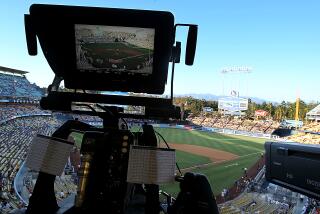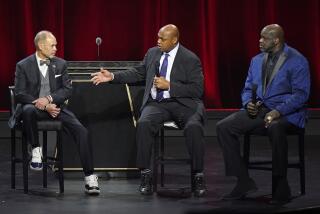DirecTV plays hardball with Dodgers and other sports channels

Satellite broadcaster DirecTV has been running a clever marketing campaign about the bad things that can happen to people who subscribe to cable.
If a cable company — say Time Warner Cable — decided to parody those DirecTV commercials, it might go something like this:
“If you have DirecTV, you can’t see the Dodgers, USC or UCLA. When you can’t see the Dodgers, USC or UCLA, you get mad. When you get mad, you climb on to your roof to kick your satellite dish. When you climb on to your roof to kick your satellite dish, you end up face down in the driveway with broken bones. Don’t end up face down in the driveway with broken bones, subscribe to Time Warner Cable.”
DirecTV is betting that its decision to not carry the new Dodgers channel SportsNet LA — at least at the terms being offered by Time Warner Cable — won’t leave it face down in the driveway.
ON LOCATION: Where the cameras roll
When DirecTV first started competing against cable, it devised a winning strategy that differentiated its service from existing cable providers: sports. It spent heavily on sports programming to woo customers. Not only did it carry just about every sports network out there, it also landed exclusive content including the National Football League’s Sunday Ticket, which gives subscribers access to every game and is hugely popular.
As of late though, DirecTV seems to have fallen out of love with sports even at the risk of alienating some of its customer base. Besides SportsNet LA, DirecTV also isn’t carrying the Pac-12 networks, home to USC and UCLA sports. Rising costs coupled with teams and leagues starting their own networks has reduced the value sports once held to DirecTV.
Still, given that Los Angeles is DirecTV’s biggest market and that the company is headquartered in El Segundo, the hardball has surprised some watchers of the company.
“To give up the Dodgers and all the college teams so important to your community just seems shocking,” said Rich Greenfield, an analyst with BTIG.
To be sure, DirecTV is not the only provider refusing to carry SportsNet LA. Cox, FiOS, U-Verse, Charter and Dish also are yet to strike deals with Time Warner Cable, which is handling distribution for the Dodgers-owned channel.
PHOTOS: Faces to watch 2014 | Digital media
DirecTV also has yet to seal a deal to carry ESPN’s new SEC Network, which launches this year and will carry the bulk of college football games from the Southeastern Conference. In addition, DirecTV is working on a deal to renew Sunday Ticket, which expires at the end of the coming football season.
In the past, renewals with the NFL have been done well in advance of expiration and have included large increases. In the last decade the price for Sunday Ticket has more than doubled. Last year, DirecTV Chief Executive Mike White said Sunday Ticket is a “pretty mature product.”
On its website, DirecTV said sports has caused “everyone’s bill for basic TV to more than double in the past decade.” In a not-so-subtle shot at the Dodgers and Time Warner Cable, the company added that “in many large cities, the cost for fans to keep the same local teams’ games they’ve always had will double still again between this year and next.”
DirecTV said despite the recent spats with sports networks, its appetite for the content hasn’t lessened.
“We still pride ourselves on being the sports leader because we carry more national and local sports than any other provider. We’d like to offer all major sports programming but not at any price and certainly not when it becomes a tax on all our customers,” said a DirecTV spokesman.
PHOTOS: Behind the scenes of movies and TV
Sports isn’t the only concern of DirecTV. It is looking to cut any networks it feels are not must-have for its customers. It recently dropped the Weather Channel rather than pay an increase for a service it felt was already overpriced. Earlier this week, DirecTV announced a three-year deal to distribute WeatherNation, a much less expensive service that Weather Channel insiders have griped is little more than a cheap knockoff.
With more than 20 million subscribers in the U.S., DirecTV is the nation’s second-largest pay-TV distributor behind Comcast, which has around 22 million customers. It has been more immune to cord-cutting, and in 2013 the company had a net income of $2.9 billion on revenues of $31.75 billion. Its market cap is about $40 billion.
Also, DirecTV often scores much higher in customer service surveys than cable, and its push to woo wealthy customers has paid off.
But the U.S. market is fairly mature, and the proposed merger of Comcast and Time Warner Cable has DirecTV concerned. In February, White said the deal “certainly creates some significant changes in the competitive landscape that we need to think hard about.”
PHOTOS: Celebrities by The Times
In the wake of the Comcast-Time Warner Cable deal, there has been renewed speculation about the idea of DirecTV combining with rival Dish Network, which has about 14 million subscribers. The companies tried to merge in 2002, but the government shot it down, saying it was anti-competitive.
Both DirecTV’s White and Dish Chairman Charlie Ergen have said that there is a lot of logic to teaming. However, the regulatory hurdles remain, and veteran analysts are skeptical that a deal could be pulled off.
“Unfortunately, the odds of successfully completing a merger must be deemed relatively low,” wrote media analyst Craig Moffett in a report last month.
DirecTV has also been investing heavily in Latin America. It has 17 million subscribers in the region, and 2013 revenues were near $7 billion. With a 31% share of the region, there is plenty of room for DirecTV to grow, and it already is the market leader.
Like many cable companies, DirecTV is also entering the home security business in search of new revenues.
GRAPHIC: Best of 2013 | Entertainment and culture
DirecTV is often seen as at a competitive disadvantage because unlike its cable and telephone company competitors, which can offer broadband services, it is a pure video play. The company does team with broadband providers to sell bundles of service to customers, but that is not the same as being in the broadband business.
This is partly why DirecTV made a play for the online video service Hulu last year. White hinted in a recent call with analysts that the company wants to launch its own low-budget online video service that could perhaps woo customers without cannibalizing its core business.
“DirecTV only has a video business, and that is hitting a wall,” said Greenfield, adding that without broadband, DirecTV “can’t play in the same way” as its competitors.
Of course, analysts have been citing this as a concern for years. A 2006 Wall Street Journal story in 2006 was headlined “Satellite TV growth is losing altitude as cable takes off” and warned that many saw a bleak future for the industry.
Despite the uncertainly of the entertainment landscape and fears of consumers opting out of high-priced pay TV packages in favor of Netflix, Hulu and Amazon, DirecTV’s stock has been strong. It closed at $78.39 per-share Wednesday, up almost 40% from a year ago.
ALSO:
A DirecTV - Dish merger faces high hurdles
Landing DirecTV is key for new Dodgers channel
DirecTV no longer carrying Weather Channel after contract dispute
Follow Joe Flint on Twitter @JBFlint.
More to Read
From the Oscars to the Emmys.
Get the Envelope newsletter for exclusive awards season coverage, behind-the-scenes stories from the Envelope podcast and columnist Glenn Whipp’s must-read analysis.
You may occasionally receive promotional content from the Los Angeles Times.







